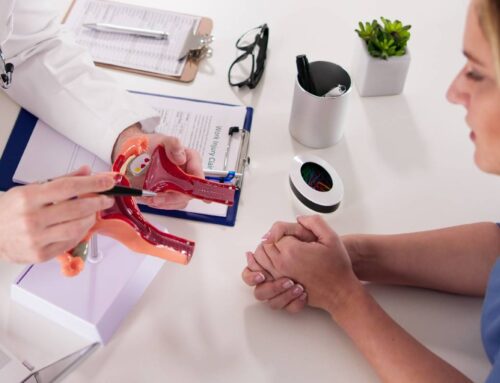
Pregnancy is an exciting time, but it can also bring some uncomfortable changes, including constipation. Hormonal shifts, dietary adjustments, and the physical pressure of a growing baby can all contribute to sluggish digestion. If you’re dealing with constipation, you may wonder, “Can I take a stool softener with Miralax while pregnant?” A Woman’s Place in Naples, FL, is here to help you navigate this common concern safely.
Stool Softeners and Miralax: Are They Safe During Pregnancy?
The short answer is yes, stool softeners and Miralax are generally considered safe for use during pregnancy. However, it’s essential to consult your OB/GYN before starting any new medications or supplements, even over-the-counter ones.
Here’s a closer look at each option:
Stool Softeners
Stool softeners like docusate sodium (Colace) work by drawing water into the stool, making it easier to pass. They are a gentle option often recommended during pregnancy because they don’t stimulate the bowel or cause cramping. Stool softeners are most effective for preventing constipation rather than treating it once it has become severe.
Miralax
Miralax (polyethylene glycol 3350) is an osmotic laxative that works by retaining water in the bowels, helping soften stool and promote regular bowel movements. It’s also non-stimulant, meaning it’s unlikely to cause discomfort or cramping.
Combining Stool Softeners and Miralax
In some cases, combining stool softeners with Miralax may provide effective relief. For example:
- Stool softeners can help make hard stools easier to pass.
- Miralax can address underlying sluggishness by increasing water retention in the bowels.
However, it’s vital to follow your doctor’s recommendations regarding dosage and frequency. Overusing laxatives or stool softeners can lead to dehydration, electrolyte imbalances, or dependency.
Tips for Managing Constipation During Pregnancy
In addition to using medications like stool softeners or Miralax, consider these lifestyle changes to improve digestion:
- Stay Hydrated: Aim to drink at least 8-10 glasses of water daily.
- Increase Fiber Intake: Include fiber-rich foods like fruits, vegetables, whole grains, and legumes in your diet.
- Stay Active: Gentle exercises, such as walking or prenatal yoga, can stimulate bowel movements.
- Eat Smaller, More Frequent Meals: This can ease the digestive process and reduce strain on your stomach.
- Don’t Ignore the Urge: Go to the bathroom as soon as you feel the need to avoid worsening constipation.
When to Call Your Doctor
If constipation persists despite trying these measures, or if you experience severe abdominal pain, rectal bleeding, or other unusual symptoms, contact your healthcare provider immediately. These could indicate a more serious issue requiring medical attention.
At A Woman’s Place in Naples, FL, we are dedicated to supporting your health and well-being throughout pregnancy. If you have questions about managing constipation or any other concerns, contact us.
Further Reading: For more information about managing constipation during pregnancy, visit March of Dimes.
Pregnancy is an exciting time, but it can also bring some uncomfortable changes, including constipation. Hormonal shifts, dietary adjustments, and the physical pressure of a growing baby can all contribute to sluggish digestion. If you’re dealing with constipation, you may wonder, “Can I take a stool softener with Miralax while pregnant?” A Woman’s Place in Naples, FL, is here to help you navigate this common concern safely.
Stool Softeners and Miralax: Are They Safe During Pregnancy?
The short answer is yes, stool softeners and Miralax are generally considered safe for use during pregnancy. However, it’s essential to consult your OB/GYN before starting any new medications or supplements, even over-the-counter ones.
Here’s a closer look at each option:
Stool Softeners
Stool softeners like docusate sodium (Colace) work by drawing water into the stool, making it easier to pass. They are a gentle option often recommended during pregnancy because they don’t stimulate the bowel or cause cramping. Stool softeners are most effective for preventing constipation rather than treating it once it has become severe.
Miralax
Miralax (polyethylene glycol 3350) is an osmotic laxative that works by retaining water in the bowels, helping soften stool and promote regular bowel movements. It’s also non-stimulant, meaning it’s unlikely to cause discomfort or cramping.
Combining Stool Softeners and Miralax
In some cases, combining stool softeners with Miralax may provide effective relief. For example:
- Stool softeners can help make hard stools easier to pass.
- Miralax can address underlying sluggishness by increasing water retention in the bowels.
However, it’s vital to follow your doctor’s recommendations regarding dosage and frequency. Overusing laxatives or stool softeners can lead to dehydration, electrolyte imbalances, or dependency.
Tips for Managing Constipation During Pregnancy
In addition to using medications like stool softeners or Miralax, consider these lifestyle changes to improve digestion:
- Stay Hydrated: Aim to drink at least 8-10 glasses of water daily.
- Increase Fiber Intake: Include fiber-rich foods like fruits, vegetables, whole grains, and legumes in your diet.
- Stay Active: Gentle exercises, such as walking or prenatal yoga, can stimulate bowel movements.
- Eat Smaller, More Frequent Meals: This can ease the digestive process and reduce strain on your stomach.
- Don’t Ignore the Urge: Go to the bathroom as soon as you feel the need to avoid worsening constipation.
When to Call Your Doctor
If constipation persists despite trying these measures, or if you experience severe abdominal pain, rectal bleeding, or other unusual symptoms, contact your healthcare provider immediately. These could indicate a more serious issue requiring medical attention.
At A Woman’s Place in Naples, FL, we are dedicated to supporting your health and well-being throughout pregnancy. If you have questions about managing constipation or any other concerns, contact us.
Further Reading: For more information about managing constipation during pregnancy, visit March of Dimes.









